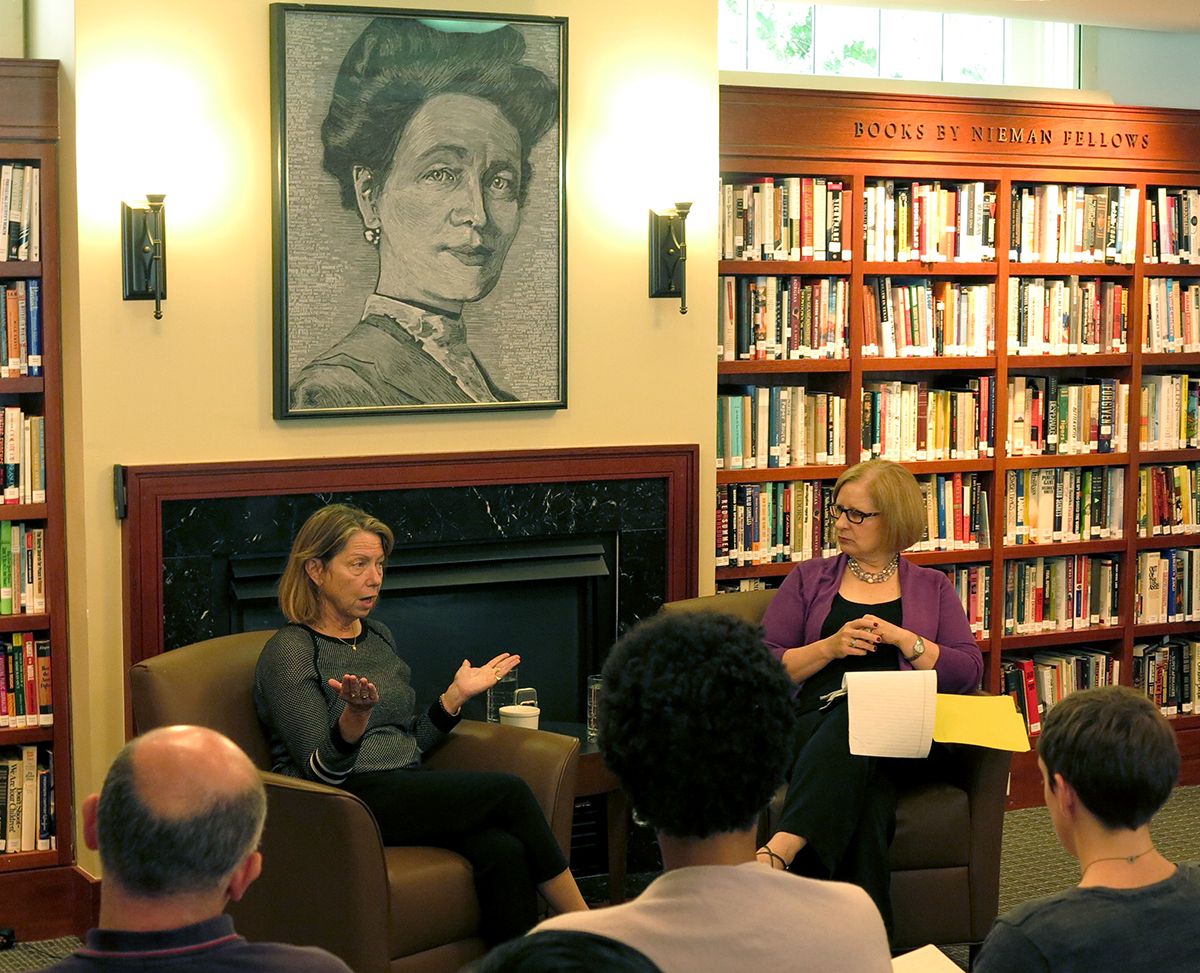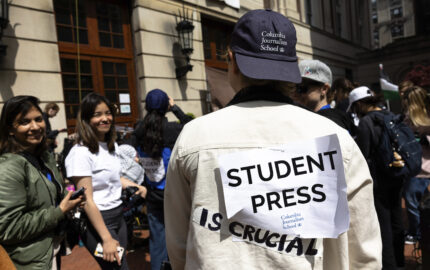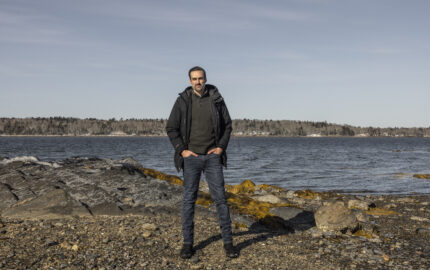Former New York Times executive editor Jill Abramson is currently teaching narrative nonfiction at Harvard, where she received her undergraduate degree in 1976. She was an investigative reporter and deputy Washington bureau chief with the Wall Street Journal from 1988 to 1997 before moving to The Times, where she served as Washington bureau chief, managing editor and, ultimately, executive editor.
As a Harvard senior, Abramson was arts editor of the Harvard Independent. She met with the current class of Nieman Fellows for a discussion about female newsroom leadership, the future of foreign correspondents and the Obama administration’s legal pursuit of journalists. Edited excerpts from her remarks:
Jill Abramson It was painful, but some of the articles that were written—I'd cite Susan Glasser's piece, “Editing While Female”—I love. That wasn't really about my personal qualities, but she was saying, ‘I was described exactly the same way at the Washington Post.’ Of course, it was painful. I'm not going to be completely Panglossian about the experience of losing a job that I loved and was very stimulated by. I don't want to come off as being full of myself … I think I was putting out the most excellent kind of news reports. I'm totally proud of that. It was totally painful to not be able to do that anymore.
I would describe myself as passionate about journalism, dogged in wanting to get to the truth and to the bottom of a story, inspirational to some people, maybe not everybody. And now I would add, resilient.
People can take the moral of my story however they want, and someone could certainly discount what I'm about to say and say, ‘Yeah, but you got fired.’ Of course, I got fired. But I think that the only way to do a job really well or to live your life is to be authentic. I'm a direct person. That's how I am. To spend a whole lot of time with an interior voice second‑guessing how you've said something or what you're going to say or endlessly trying to say, ‘Is my style too brusque or too pushy or not gentle enough, or how am I coming cross?’ I just think that's going to get in the way. It's the only way I know how to be. I've talked to a number of other very successful women in important leadership positions, some who've recently retired, and all of them have stressed the importance of authenticity to me.
I reflect on it every day. Just yesterday, I was reading an article about Sheryl Sandberg and the verb that was used for whatever she was saying was, she “chirped.” It rankled me. I think that's so typical, though. You wouldn't say, [Mark] Zuckerberg “chirped.” You just wouldn't.
I actually spent a good part of this summer engaged in something that I found very interesting and thought‑provoking. It was a digital book group, where a group of us reread Susan Faludi's book "Backlash." It was mostly women considerably younger than me. I would have thought a number of these problems would have been addressed already, because that book was published more than 20 years ago.
It isn't just workplace issues. I'm surprised about American society and policy more broadly. Many women still do not have maternity leave or guaranteed sick days on their job. Jodi Kantor just wrote that fantastic piece in The Times about the woman who worked at Starbucks who has no sense of what her schedule is, which wreaks havoc with trying to care for her child.
The fact that this is the United States in 2014 and these things are still so unaddressed is shocking. When I was entering Harvard in 1972 I was part of the first class of women who were allowed to live in Harvard Yard; I raised my hand, ‘I want to be part of that group.’ We even have our own gate in Harvard Yard; one of the gates is dedicated to the women of 1972. But I think back then if you told me all of these issues hadn't been addressed, the 1972 version of Jill Abramson would be spitting nails, spitting nails.
I would like to begin to answer by introducing a bit of a new perspective, which is just following the Hong Kong story, for instance, on Twitter. From my point of view, Twitter led the coverage of Hong Kong. It is citizen journalism. Long before I read a front‑page story about the demonstrations in any traditional publications, the story had become huge on Twitter. Some of it seemed to be by freelance journalists. Some I think were just by activists who were on the scene. That is vibrant and new and something that I think we ignore at our peril. We no longer live in a world where something isn't covered because CNN isn't there.
Look at Iran. The Green Revolution in Iran was too dangerous for many Western journalists to be on the streets, and there you had the beginning of the same phenomenon. I'm not trying to be a Pollyanna and say, ‘Citizens can cover every story, even Syria,’ although there are some people inside Syria who are actually doing this at great risk to themselves. The security of journalists working in the field is so important and such a vexing and terrifying issue.
At the Journal, one of my closest friends and someone in Washington I did a lot of stories with was Danny Pearl. No one ever had to remind me of the risk that is involved in that kind of work. I think that having journalistic institutions that can afford to give rigorous training to any journalists who are going into dangerous areas is very important. It's a huge problem.
I [recently met] with a fairly new and young news organization called Storyhunter. What they're trying to do is develop a network of freelancers in foreign locations and some of them in dangerous places, to find a way to offer them basic insurance and also to get them a more steady stream of assignments to take advantage of the fact that they are where they are and get them work for institutions that maybe can begin to provide the kind of support we're talking about.
Jim Risen has been subpoenaed in the Sterling case [Risen refused to reveal his sources after being subpoenaed in relation to the investigation of Jeffrey Sterling under the Espionage Act], which is one of eight criminal leak prosecutions that the Obama administration has chosen to pursue. That is more than double the number of such cases that exist in all of history before that. Eric Holder had said in a meeting with editors and prominent journalists in Washington that no journalist would go to jail for doing his or her job while he was attorney general, and it makes me a little nervous to see now we don't know who the [next] attorney general is going to be.
I've been very vocal, both while I was executive editor and since then about my belief that these leak investigations put a chill on very important reporting on classified intelligence programs, and that if there's a war on terror being waged in the name of the American people, I believe the people need to know the dimensions of that. If there's sweeping eavesdropping, I feel the public has an urgent need to know that.
The founders of our country were deathly afraid of over‑centralized power. The reason there is a First Amendment is because they believed passionately in our watchdog role, that a free press was vital to keep a check on the government and to keep the public informed. That is our calling. I'm frankly surprised at how secretive and prosecution prone and leak investigation prone the Obama White House has been. I lived through the Bush years and some of these investigations were started by the Bush administration. But in the Risen case the subpoena had lapsed and the Obama administration renewed it.
As a Harvard senior, Abramson was arts editor of the Harvard Independent. She met with the current class of Nieman Fellows for a discussion about female newsroom leadership, the future of foreign correspondents and the Obama administration’s legal pursuit of journalists. Edited excerpts from her remarks:
There are descriptions of you in the wake of being fired as “bossy,” “stubborn,” “condescending,” “uncaring,” “arbitrary.” What’s it like to see yourself described in those ways? And how would you describe yourself?
Jill Abramson It was painful, but some of the articles that were written—I'd cite Susan Glasser's piece, “Editing While Female”—I love. That wasn't really about my personal qualities, but she was saying, ‘I was described exactly the same way at the Washington Post.’ Of course, it was painful. I'm not going to be completely Panglossian about the experience of losing a job that I loved and was very stimulated by. I don't want to come off as being full of myself … I think I was putting out the most excellent kind of news reports. I'm totally proud of that. It was totally painful to not be able to do that anymore.
I would describe myself as passionate about journalism, dogged in wanting to get to the truth and to the bottom of a story, inspirational to some people, maybe not everybody. And now I would add, resilient.
You’ve talked about the importance of women leaders being their authentic selves. Why is that particularly urgent for women?
People can take the moral of my story however they want, and someone could certainly discount what I'm about to say and say, ‘Yeah, but you got fired.’ Of course, I got fired. But I think that the only way to do a job really well or to live your life is to be authentic. I'm a direct person. That's how I am. To spend a whole lot of time with an interior voice second‑guessing how you've said something or what you're going to say or endlessly trying to say, ‘Is my style too brusque or too pushy or not gentle enough, or how am I coming cross?’ I just think that's going to get in the way. It's the only way I know how to be. I've talked to a number of other very successful women in important leadership positions, some who've recently retired, and all of them have stressed the importance of authenticity to me.
The Nieman Reports issue on female newsroom leaders examines how we talk about women in power, how we describe their styles and the extent to which it's different than how we talk about men in power. What are your reflections on that?
I reflect on it every day. Just yesterday, I was reading an article about Sheryl Sandberg and the verb that was used for whatever she was saying was, she “chirped.” It rankled me. I think that's so typical, though. You wouldn't say, [Mark] Zuckerberg “chirped.” You just wouldn't.
I actually spent a good part of this summer engaged in something that I found very interesting and thought‑provoking. It was a digital book group, where a group of us reread Susan Faludi's book "Backlash." It was mostly women considerably younger than me. I would have thought a number of these problems would have been addressed already, because that book was published more than 20 years ago.
It isn't just workplace issues. I'm surprised about American society and policy more broadly. Many women still do not have maternity leave or guaranteed sick days on their job. Jodi Kantor just wrote that fantastic piece in The Times about the woman who worked at Starbucks who has no sense of what her schedule is, which wreaks havoc with trying to care for her child.
The fact that this is the United States in 2014 and these things are still so unaddressed is shocking. When I was entering Harvard in 1972 I was part of the first class of women who were allowed to live in Harvard Yard; I raised my hand, ‘I want to be part of that group.’ We even have our own gate in Harvard Yard; one of the gates is dedicated to the women of 1972. But I think back then if you told me all of these issues hadn't been addressed, the 1972 version of Jill Abramson would be spitting nails, spitting nails.
In the last couple of months we've had shocking examples of freelancers losing their lives in very risky circumstances, covering stories overseas, and many of them loosely tethered to news organizations that aren't watching over them with the sort of care that a staff, like a foreign staff at The New York Times, can do. Where is that model going?
I would like to begin to answer by introducing a bit of a new perspective, which is just following the Hong Kong story, for instance, on Twitter. From my point of view, Twitter led the coverage of Hong Kong. It is citizen journalism. Long before I read a front‑page story about the demonstrations in any traditional publications, the story had become huge on Twitter. Some of it seemed to be by freelance journalists. Some I think were just by activists who were on the scene. That is vibrant and new and something that I think we ignore at our peril. We no longer live in a world where something isn't covered because CNN isn't there.
Look at Iran. The Green Revolution in Iran was too dangerous for many Western journalists to be on the streets, and there you had the beginning of the same phenomenon. I'm not trying to be a Pollyanna and say, ‘Citizens can cover every story, even Syria,’ although there are some people inside Syria who are actually doing this at great risk to themselves. The security of journalists working in the field is so important and such a vexing and terrifying issue.
At the Journal, one of my closest friends and someone in Washington I did a lot of stories with was Danny Pearl. No one ever had to remind me of the risk that is involved in that kind of work. I think that having journalistic institutions that can afford to give rigorous training to any journalists who are going into dangerous areas is very important. It's a huge problem.
I [recently met] with a fairly new and young news organization called Storyhunter. What they're trying to do is develop a network of freelancers in foreign locations and some of them in dangerous places, to find a way to offer them basic insurance and also to get them a more steady stream of assignments to take advantage of the fact that they are where they are and get them work for institutions that maybe can begin to provide the kind of support we're talking about.
Are you concerned about lack of transparency with the Obama administration, the pursuit of journalists in the course of doing their jobs?
Jim Risen has been subpoenaed in the Sterling case [Risen refused to reveal his sources after being subpoenaed in relation to the investigation of Jeffrey Sterling under the Espionage Act], which is one of eight criminal leak prosecutions that the Obama administration has chosen to pursue. That is more than double the number of such cases that exist in all of history before that. Eric Holder had said in a meeting with editors and prominent journalists in Washington that no journalist would go to jail for doing his or her job while he was attorney general, and it makes me a little nervous to see now we don't know who the [next] attorney general is going to be.
I've been very vocal, both while I was executive editor and since then about my belief that these leak investigations put a chill on very important reporting on classified intelligence programs, and that if there's a war on terror being waged in the name of the American people, I believe the people need to know the dimensions of that. If there's sweeping eavesdropping, I feel the public has an urgent need to know that.
The founders of our country were deathly afraid of over‑centralized power. The reason there is a First Amendment is because they believed passionately in our watchdog role, that a free press was vital to keep a check on the government and to keep the public informed. That is our calling. I'm frankly surprised at how secretive and prosecution prone and leak investigation prone the Obama White House has been. I lived through the Bush years and some of these investigations were started by the Bush administration. But in the Risen case the subpoena had lapsed and the Obama administration renewed it.



